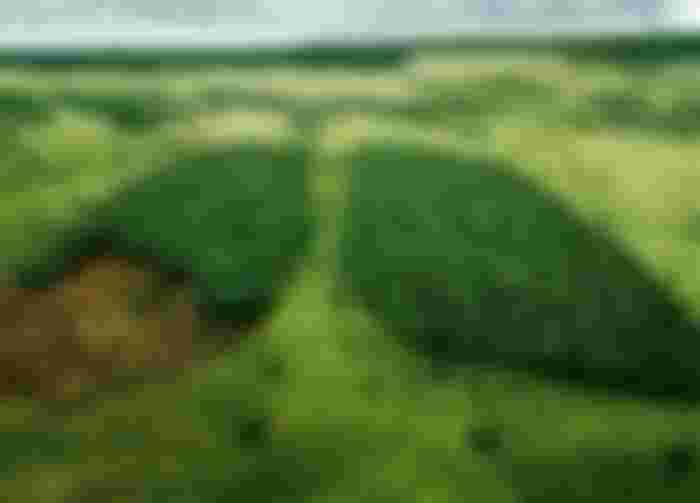Global Catastrophes
This article is intended to draw people's attention to global environmental problems and their causes. The Earth is our home, but do we often think about what happens to it and the impact we humans have on it? In this article, I will touch on many of the environmental problems caused by humans themselves.
Nature is a large and interesting world that surrounds us. There is never a moment's respite from life. We live in this world. We are surrounded by many objects. They are created by human hands. These are buildings, roads, bridges, clothes, shoes, cars, furniture, computers. But there are many things that came into being by themselves, without human help: land and water, trees and animals, the sun and sky. This is nature.
Man is also part of nature. This does not mean that people can do anything in nature. We should be careful with it: help the animals and birds, take care of the plants, take care of the water, land and air. Many people prefer to spend their free time in nature. Tourism and the sprawl of big cities can destroy the habitats of animals and plants. Natural resources are non-renewable and can be depleted. Therefore it is necessary to save raw materials.
Environmental pollution is detrimental to the health of all living beings. Smoke from forest fires, industrial emissions, and transport damage the environment.
Some people throw garbage into rivers or set up garbage dumps in the streets. Waste and toxic discharges into the water harm fish and aquatic animals, and cause disease in both animals and humans. Automobile exhaust fumes pollute the air. The natural environment is seriously contaminated, and it is very difficult to eliminate pollution. To keep our environment clean, the government passes laws to prevent pollution. But our lives and the lives of those who live on the planet can change for the better. If each of us would be considerate and loving to all living things.
Many years ago, a new species of primate, Homo sapiens, appeared on our planet. From that moment the evolutionary round of human development began. For thousands of years the human being has evolved and influenced the world around him. With evolution came progress. With the emergence of the mind, man learned to create various objects, constructions in one way or another aimed at satisfying his needs. There was a time when man influenced the nature essentially unconsciously, not thinking about the consequences of his actions and how he could influence the environment. But for the last millennium, man had a mind, a consciousness. And he had to understand what the consequences of his actions would be in relation to nature. The only problem is that some people don't think about this until now, because satisfying their own interests and needs is in the first place. From here I will start my story about the problems of the nature of the 21st century and the last 200 hundred years, the reason of which is human progress and unconscious attitude to the nature.
The extinction of certain animal species.

Even at the beginning of mankind's journey, humans hunted various animals in an attempt to survive. In order to satisfy their animal needs, they did not think about the fact that the over-the-top hunting and extermination of animals would cause the complete extinction of certain species. Perhaps this is one of man's first sins toward the environment that continues to exist to this day. For all the time on our planet really amazing and rare for the ecosystem animals have been destroyed this concerns all: fish, birds, mammals, which is an irreplaceable loss, causing regret and sympathy. Still, man at a particular stage realized that the routine killing of specific species of animals would sooner or later lead to their complete extinction. So he has learned to tame them and maintain their population. This is the case for the most part with livestock, which is one of the main sources of food for humans. But unfortunately, at the moment there are still species in the modern world that are included in the red book and are on the brink of extinction for the most part due to human activity.
Deforestation.

One of the reasons, which has been created by human hands since the advent of man, is deforestation. Of course, this type of activity began to gain its maximum momentum in the last century. During this time, the number of forests has decreased from the total number of all forests on our planet. This human activity has changed the balance of the ecosystem. First of all it is connected with reduction of oxygen emitted by plants into atmosphere that in its turn affects occurrence of ozone holes. The appearance of these holes affects the destruction of the ozone layer of the earth, which in turn protects our planet from the negative effects of solar radiation and cosmic radiation. This is just one of the reasons for the global warming we are seeing right now. Deforestation in itself would not be harmful if man were to make up for what he has taken. Unfortunately, human nature is the root cause of all these problems. Behind every enterprise dealing with deforestation there are people. People, who satisfy their financial needs. Selling timber in the 21st century is a very profitable business, considering how much timber a particular company can provide for its clients. Unfortunately, people involved in logging most often do not think about the consequences of their activities. They do not care about the future fate of that forest, much less what problems will arise in connection with its logging. More often than not, deforested forests are left with lifeless areas that have been filled with various animals. This is how the balance of the ecosystem is disturbed. Among other things, we do not think about the fate of other creatures whose home was the logged forest. There are few companies in the world which, after cutting down a forest, replenish it by uprooting old stumps and replanting the area with young trees. Unfortunately, this procedure also costs money, and not every logging company can afford it. But as I said before, most of the time it's more important for people to make a profit than to lose it. That's why most people won't even spend money on something like this.
A technological breakthrough.

The next reason for the global natural problems of the 21st century, is the technological progress of man. With the advent of technology, we began to build various factories, power plants of various types and so on. The problem is that most of these enterprises have a negative impact on the environment in one way or another. The two main problems of such enterprises are: 1) Atmospheric pollution; 2) Pollution of water bodies.
The first problem is the pollution of the atmosphere with various harmful compounds that have a negative impact not only on the environment, but also on humans themselves. It is also the release of carbon and vapors of various types, which form a greenhouse effect and also reduce the level of oxygen in the atmosphere, which leads to the formation of ozone holes. Global warming as a result of such human activity leads to the melting of glaciers, which in turn can conceal even greater dangers. Various bacteria and organisms that have been hiding for thousands of years under a thick layer of ice are coming out, thus creating new types of diseases and virus strains.
The second problem is the pollution of water bodies. Enterprises located in the vicinity of water bodies and using water from these water bodies in their activities also have a negative impact on the environment. Unfortunately, most of such enterprises pollute water bodies that are close to them. First and foremost, this consists in the discharge of waste and recycled water into these water bodies. Thus, not only does the problem of pollution of water bodies appear, but also the problem of the reduction of pure fresh water reserves. More often than not, such plants are located on rivers. Rivers in most cases are an entire system. And this is where the principle of waste spreading from one place to another through the flow works. You can make the analogy of a drug injected into the human body through a vein, it will spread throughout the whole bloodstream. It is the same with rivers.
As I said earlier, man plays a big role in all of this. Progress in itself is not a negative problem affecting the world around us. The problem is man's unwillingness to reduce the intensity of the impact of his progress on nature. Behind every such enterprise is man, who in one way or another seeks to satisfy his own interests and those of others. Every technological enterprise is profitable in one way or another. And people sometimes do not think about the harm that these enterprises may cause to people and nature. Because the main objective of maintaining these enterprises is always to make a profit. No one will think about investing money in the environmentally-oriented modernization of the enterprise. Because most often it is expensive and not profitable for the people who run these enterprises. After all, it is always easier to have an enterprise that is cheaper to maintain, but which generates more profit. Otherwise, every year to change the sewage treatment plants and filters, according to these people will be economically unprofitable.
Extraction of minerals.

With progress, man has learned not only how to hunt animals and build plants, but also how to extract minerals that can be used to his advantage. Unfortunately, even with this, man can harm nature. The main problems of this cause are the extraction and processing: oil, coal, and radioactive substances. And so about everything in order.
Oil is one of the most important components of human life in the 21st century. With its help we get gas for the house, fuel for cars and even components for various cosmetics. But unfortunately, even during the extraction of oil man faces problems that have a negative impact on the environment. The first problem humans can face is an oil spill. Be it on land or in water. In any case, it disturbs the balance in the ecosystem of a particular part of our planet, because of which nature suffers. Soil, water gets polluted and most often it leads to death of birds, fish and other animals. The second problem is the combustion of the oil itself. When it burns, huge amounts of harmful substances are released into the atmosphere, including those that contribute to the destruction of the ozone layer.

Coal is also an important component of human life; without it, trains would not run and many businesses would not operate. But coal mining is not as simple as it seems at first glance. When coal is mined and processed, a huge amount of coal dust is released. All this dust rises with the air to the upper layers of the atmosphere, polluting it and is dispersed by the wind over the surrounding areas. Then it falls in layers to specific areas of the earth. Thus, pollution occurs, because of which the people themselves suffer, because they breathe it.
And the last thing I want to talk about in this topic is the mining, processing, and use of radioactive substances. One could say that in skilled hands these substances are not dangerous for the environment, but unfortunately this is far from it. The human progress in the development of nuclear power knows not a few examples of the threat to the entire ecosystem. One of the brightest examples is the explosion at the Chernobyl nuclear power plant. The horror of this example is that in 1986 mankind for the first time became aware of the real danger of contamination of the environment with radioactive substances. At that time, the timely correction of the consequences of the explosion and the prevention of other consequences saved mankind and the ecological system from global catastrophe. After all, it could be that a large part of the planet would have been contaminated by radiation that would have destroyed all life on its path and the decay of which would have taken centuries. The use and development of nuclear weapons play no small role in this topic. Because the consequences of using these weapons are also devastating to the ecological environment in the area where they are used. Also, the use of this type of weapon affects the displacement of the axis of rotation of the earth, which also negatively affects the ecosystem of the planet as a whole.
Trash

In today's world, humanity every second throws into the trash a variety of wastes and products of their life activities. Mostly inorganic products of consumption, which in normal conditions would take thousands of years to recycle by nature. Every day man produces and throws into the environment several thousand tons of garbage. And not all of this amount is completely destroyed or recycled for further use. In most countries enormous amounts of waste are not recycled but are stored in landfills or polluted. Ultimately, all non-recyclable garbage is a threat to the environment. Huge quantities of trash accumulate on land in designated areas, but the impact of these areas on the environment over time is negative. Conventional landfills with garbage under the influence of the sun sooner or later begin to produce and emit harmful substances into the atmosphere, thereby poisoning the air we breathe. A huge problem also plays trash contamination of the soil and water bodies. The most dangerous of the problems is the pollution of the world's oceans by garbage islands. Birds, fish, and sea mammals are dying because of the formation of trash islands and the trash falling into various depths.
The reason for all this is that people are not aware of this problem. People in most countries are not in the habit of protecting the place where they live. There is no education for the right attitude to nature. And there is no desire to follow certain rules, which would allow for effective recycling. In this case I mean the separate collection of waste. Using the example of Russia, we can say that this type of return and collection of garbage is not popular. Waste of different origin and appearance is formed into a pile and sent to a landfill, where it is dead weight and compacted into the soil. Also in our country there are not enough specialized points of reception and delivery of garbage, and also there are no modern and environmentally-oriented recycling plants. All this ultimately speaks to the lack of willingness of people and specific states to properly treat nature, disposal and recycling of the garbage produced.
Conclusion.

I have named in my opinion the most important problems of the environment in the 21st century. And what I wanted to say in the end. Yes, the cause of the formation of these problems is, for the most part, man. But man alone has the strength, capabilities and resources to fix it, if only we had the desire. And I would like to pay special attention to this. Speaking about each of the problems, in the end I was talking about the fact that all these sins in relation to nature are committed by people who for the most part think only about themselves, about satisfying their interests and needs, who do not attach importance to the damage they do not even to the environment, but to their home. After all, our planet is our home. Our planet and its nature have given us the opportunity to live, and we humans are so careless about it. In fact, every year we doom each other to certain death. I want my words make many people think about what they live for. In fact, in today's world and society, almost everyone lives for themselves, to meet some of their material and spiritual needs, and not for anything-more, as it should be. And in the pursuit of all this, we don't really notice what is worth living for. We don't notice what really needs our attention. Financial opportunity plays a huge role in restoring nature to our planet. Unfortunately, not everyone is willing to spend their finances for this very purpose, because like I said, most people are used to spending money only on themselves, even if they have plenty of it. I mean, there are a lot of people and projects in our world that are concerned about the environment and want to fix it, but they just don't have that financial capability. And there are very few people in the world who want to do something about it and make it better, and the majority of the people who do it continue to do it, even though it's wrong. So I would like to appeal to all those who directly affect the environment, to those who have a lot of money, but for some reason live for themselves. I want you to listen to what I have to say. Our world is our home. It is our responsibility to preserve that home at all costs. Most of you may say that "it's none of my business", that "the planet is enough for my lifetime and it's important to live my life, and what happens next is no longer my problem". But it is your problem. Think about what will be left to your descendants after you - an acquired wealth or a pile of cars and jewelry made of gold? Maybe, but what good will it do, if you can't take it all to the next world or into the grave, and your descendants won't say thank you for the planet you'll leave them after you. A planet which will be unfit for normal life, where because of the depleted ozone layer natural disasters and various diseases are constantly raging, where there is no fresh water, clean air and oxygen. Ask yourself - is this what you want for your future generations? If you can help someone in a good cause, it is your duty to stop living only for yourself and help those who want to make things better on our planet. We are human beings, one species, and it is our duty at this time to support each other to achieve something truly worthwhile and save our home from the mistakes we ourselves have made.







You have highlighted the bitter truth m Earth being our mother, literally what we have done to it. Few days ago I was watching video in which there was proper comparison of man life before the earth vs after the earth. Earth was filled with lush push green beauty on land , water with reflective transparent color. Now if we see on land pollution everywhere, noise and smoke on air, even sky is also disturbed from us due ozone layer depletion. We are truly responsible for this damage and also we have to cure this issue as soon as possible.